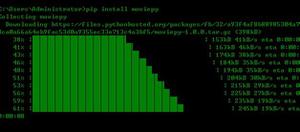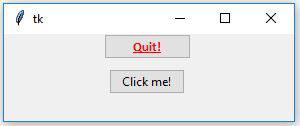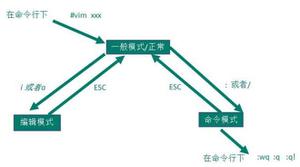Python标准库tracemalloc跟踪内存分配

3.4 新版功能.
源代码: Lib/tracemalloc.py
tracemalloc 模块是一个用于对 python 已申请的内存块进行debug的工具。它能提供以下信息:
定位对象分配内存的位置
按文件、按行统计python的内存块分配情况: 总大小、块的数量以及块平均大小。
对比两个内存快照的差异,以便排查内存泄漏
To trace most memory blocks allocated by Python, the module should be started
as early as possible by setting the PYTHONTRACEMALLOC environment
variable to 1, or by using -Xtracemalloc command line
option. The tracemalloc.start() function can be called at runtime to
start tracing Python memory allocations.
By default, a trace of an allocated memory block only stores the most recent
frame (1 frame). To store 25 frames at startup: set the
PYTHONTRACEMALLOC environment variable to 25, or use the
-Xtracemalloc=25 command line option.
例子¶
显示前10项¶
显示内存分配最多的10个文件:
importtracemalloctracemalloc.start()
# ... run your application ...
snapshot=tracemalloc.take_snapshot()
top_stats=snapshot.statistics('lineno')
print("[ Top 10 ]")
forstatintop_stats[:10]:
print(stat)
Python测试套件的输出示例:
[Top10]<frozenimportlib._bootstrap>:716:size=4855KiB,count=39328,average=126B
<frozenimportlib._bootstrap>:284:size=521KiB,count=3199,average=167B
/usr/lib/python3.4/collections/__init__.py:368:size=244KiB,count=2315,average=108B
/usr/lib/python3.4/unittest/case.py:381:size=185KiB,count=779,average=243B
/usr/lib/python3.4/unittest/case.py:402:size=154KiB,count=378,average=416B
/usr/lib/python3.4/abc.py:133:size=88.7KiB,count=347,average=262B
<frozenimportlib._bootstrap>:1446:size=70.4KiB,count=911,average=79B
<frozenimportlib._bootstrap>:1454:size=52.0KiB,count=25,average=2131B
<string>:5:size=49.7KiB,count=148,average=344B
/usr/lib/python3.4/sysconfig.py:411:size=48.0KiB,count=1,average=48.0KiB
We can see that Python loaded 4855KiB data (bytecode and constants) from
modules and that the collections module allocated 244KiB to build
namedtuple types.
更多选项,请参见 Snapshot.statistics()
计算差异¶
获取两个快照并显示差异:
importtracemalloctracemalloc.start()
# ... start your application ...
snapshot1=tracemalloc.take_snapshot()
# ... call the function leaking memory ...
snapshot2=tracemalloc.take_snapshot()
top_stats=snapshot2.compare_to(snapshot1,'lineno')
print("[ Top 10 differences ]")
forstatintop_stats[:10]:
print(stat)
Example of output before/after running some tests of the Python test suite:
[Top10differences]<frozenimportlib._bootstrap>:716:size=8173KiB(+4428KiB),count=71332(+39369),average=117B
/usr/lib/python3.4/linecache.py:127:size=940KiB(+940KiB),count=8106(+8106),average=119B
/usr/lib/python3.4/unittest/case.py:571:size=298KiB(+298KiB),count=589(+589),average=519B
<frozenimportlib._bootstrap>:284:size=1005KiB(+166KiB),count=7423(+1526),average=139B
/usr/lib/python3.4/mimetypes.py:217:size=112KiB(+112KiB),count=1334(+1334),average=86B
/usr/lib/python3.4/http/server.py:848:size=96.0KiB(+96.0KiB),count=1(+1),average=96.0KiB
/usr/lib/python3.4/inspect.py:1465:size=83.5KiB(+83.5KiB),count=109(+109),average=784B
/usr/lib/python3.4/unittest/mock.py:491:size=77.7KiB(+77.7KiB),count=143(+143),average=557B
/usr/lib/python3.4/urllib/parse.py:476:size=71.8KiB(+71.8KiB),count=969(+969),average=76B
/usr/lib/python3.4/contextlib.py:38:size=67.2KiB(+67.2KiB),count=126(+126),average=546B
We can see that Python has loaded 8173KiB of module data (bytecode and
constants), and that this is 4428KiB more than had been loaded before the
tests, when the previous snapshot was taken. Similarly, the linecache
module has cached 940KiB of Python source code to format tracebacks, all
of it since the previous snapshot.
If the system has little free memory, snapshots can be written on disk using
the Snapshot.dump() method to analyze the snapshot offline. Then use the
Snapshot.load() method reload the snapshot.
获取一个内存块的溯源¶
一段找出程序中最大内存块溯源的代码:
importtracemalloc# Store 25 frames
tracemalloc.start(25)
# ... run your application ...
snapshot=tracemalloc.take_snapshot()
top_stats=snapshot.statistics('traceback')
# pick the biggest memory block
stat=top_stats[0]
print("%s memory blocks: %.1f KiB"%(stat.count,stat.size/1024))
forlineinstat.traceback.format():
print(line)
一段Python单元测试的输出案例(限制最大25层堆栈)
903memoryblocks:870.1KiBFile"<frozen importlib._bootstrap>",line716
File"<frozen importlib._bootstrap>",line1036
File"<frozen importlib._bootstrap>",line934
File"<frozen importlib._bootstrap>",line1068
File"<frozen importlib._bootstrap>",line619
File"<frozen importlib._bootstrap>",line1581
File"<frozen importlib._bootstrap>",line1614
File"/usr/lib/python3.4/doctest.py",line101
importpdb
File"<frozen importlib._bootstrap>",line284
File"<frozen importlib._bootstrap>",line938
File"<frozen importlib._bootstrap>",line1068
File"<frozen importlib._bootstrap>",line619
File"<frozen importlib._bootstrap>",line1581
File"<frozen importlib._bootstrap>",line1614
File"/usr/lib/python3.4/test/support/__init__.py",line1728
importdoctest
File"/usr/lib/python3.4/test/test_pickletools.py",line21
support.run_doctest(pickletools)
File"/usr/lib/python3.4/test/regrtest.py",line1276
test_runner()
File"/usr/lib/python3.4/test/regrtest.py",line976
display_failure=notverbose)
File"/usr/lib/python3.4/test/regrtest.py",line761
match_tests=ns.match_tests)
File"/usr/lib/python3.4/test/regrtest.py",line1563
main()
File"/usr/lib/python3.4/test/__main__.py",line3
regrtest.main_in_temp_cwd()
File"/usr/lib/python3.4/runpy.py",line73
exec(code,run_globals)
File"/usr/lib/python3.4/runpy.py",line160
"__main__",fname,loader,pkg_name)
We can see that the most memory was allocated in the importlib module to
load data (bytecode and constants) from modules: 870.1KiB. The traceback is
where the importlib loaded data most recently: on the importpdb
line of the doctest module. The traceback may change if a new module is
loaded.
Pretty top¶
Code to display the 10 lines allocating the most memory with a pretty output,
ignoring <frozenimportlib._bootstrap> and <unknown> files:
importlinecacheimportos
importtracemalloc
defdisplay_top(snapshot,key_type='lineno',limit=10):
snapshot=snapshot.filter_traces((
tracemalloc.Filter(False,"<frozen importlib._bootstrap>"),
tracemalloc.Filter(False,"<unknown>"),
))
top_stats=snapshot.statistics(key_type)
print("Top %s lines"%limit)
forindex,statinenumerate(top_stats[:limit],1):
frame=stat.traceback[0]
print("#%s: %s:%s: %.1f KiB"
%(index,frame.filename,frame.lineno,stat.size/1024))
line=linecache.getline(frame.filename,frame.lineno).strip()
ifline:
print(' %s'%line)
other=top_stats[limit:]
ifother:
size=sum(stat.sizeforstatinother)
print("%s other: %.1f KiB"%(len(other),size/1024))
total=sum(stat.sizeforstatintop_stats)
print("Total allocated size: %.1f KiB"%(total/1024))
tracemalloc.start()
# ... run your application ...
snapshot=tracemalloc.take_snapshot()
display_top(snapshot)
Python测试套件的输出示例:
Top10lines#1: Lib/base64.py:414: 419.8 KiB
_b85chars2=[(a+b)forain_b85charsforbin_b85chars]
#2: Lib/base64.py:306: 419.8 KiB
_a85chars2=[(a+b)forain_a85charsforbin_a85chars]
#3: collections/__init__.py:368: 293.6 KiB
exec(class_definition,namespace)
#4: Lib/abc.py:133: 115.2 KiB
cls=super().__new__(mcls,name,bases,namespace)
#5: unittest/case.py:574: 103.1 KiB
testMethod()
#6: Lib/linecache.py:127: 95.4 KiB
lines=fp.readlines()
#7: urllib/parse.py:476: 71.8 KiB
forain_hexdigforbin_hexdig}
#8: <string>:5: 62.0 KiB
#9: Lib/_weakrefset.py:37: 60.0 KiB
self.data=set()
#10: Lib/base64.py:142: 59.8 KiB
_b32tab2=[a+bforain_b32tabforbin_b32tab]
6220other:3602.8KiB
Totalallocatedsize:5303.1KiB
更多选项,请参见 Snapshot.statistics()
API¶
函数¶
tracemalloc.clear_traces()¶Clear traces of memory blocks allocated by Python.
另见
stop().
tracemalloc.get_object_traceback(obj)¶Get the traceback where the Python object obj was allocated.
Return a
Tracebackinstance, orNoneif thetracemallocmodule is not tracing memory allocations or did not trace the allocation of
the object.
See also
gc.get_referrers()andsys.getsizeof()functions.
tracemalloc.get_traceback_limit()¶Get the maximum number of frames stored in the traceback of a trace.
The
tracemallocmodule must be tracing memory allocations toget the limit, otherwise an exception is raised.
The limit is set by the
start()function.
tracemalloc.get_traced_memory()¶Get the current size and peak size of memory blocks traced by the
tracemallocmodule as a tuple:(current:int,peak:int).
tracemalloc.get_tracemalloc_memory()¶Get the memory usage in bytes of the
tracemallocmodule used to storetraces of memory blocks.
Return an
int.
tracemalloc.is_tracing()¶Trueif thetracemallocmodule is tracing Python memoryallocations,
Falseotherwise.See also
start()andstop()functions.
tracemalloc.start(nframe: int=1)¶Start tracing Python memory allocations: install hooks on Python memory
allocators. Collected tracebacks of traces will be limited to nframe
frames. By default, a trace of a memory block only stores the most recent
frame: the limit is
1. nframe must be greater or equal to1.Storing more than
1frame is only useful to compute statistics groupedby
'traceback'or to compute cumulative statistics: see theSnapshot.compare_to()andSnapshot.statistics()methods.Storing more frames increases the memory and CPU overhead of the
tracemallocmodule. Use theget_tracemalloc_memory()functionto measure how much memory is used by the
tracemallocmodule.The
PYTHONTRACEMALLOCenvironment variable(
PYTHONTRACEMALLOC=NFRAME) and the-Xtracemalloc=NFRAMEcommand line option can be used to start tracing at startup.
See also
stop(),is_tracing()andget_traceback_limit()functions.
tracemalloc.stop()¶Stop tracing Python memory allocations: uninstall hooks on Python memory
allocators. Also clears all previously collected traces of memory blocks
allocated by Python.
Call
take_snapshot()function to take a snapshot of traces beforeclearing them.
See also
start(),is_tracing()andclear_traces()functions.
tracemalloc.take_snapshot()¶Take a snapshot of traces of memory blocks allocated by Python. Return a new
Snapshotinstance.The snapshot does not include memory blocks allocated before the
tracemallocmodule started to trace memory allocations.Tracebacks of traces are limited to
get_traceback_limit()frames. Usethe nframe parameter of the
start()function to store more frames.The
tracemallocmodule must be tracing memory allocations to take asnapshot, see the
start()function.See also the
get_object_traceback()function.
域过滤器¶
class
tracemalloc.DomainFilter(inclusive: bool, domain: int)¶Filter traces of memory blocks by their address space (domain).
3.6 新版功能.
inclusive¶If inclusive is
True(include), match memory blocks allocatedin the address space
domain.If inclusive is
False(exclude), match memory blocks not allocatedin the address space
domain.
domain¶Address space of a memory block (
int). Read-only property.
过滤器¶
class
tracemalloc.Filter(inclusive: bool, filename_pattern: str, lineno: int=None, all_frames: bool=False, domain: int=None)¶对内存块的跟踪进行筛选。
See the
fnmatch.fnmatch()function for the syntax offilename_pattern. The
'.pyc'file extension isreplaced with
'.py'.示例:
Filter(True,subprocess.__file__)only includes traces of thesubprocessmoduleFilter(False,tracemalloc.__file__)excludes traces of thetracemallocmoduleFilter(False,"<unknown>")excludes empty tracebacks
在 3.5 版更改: The
'.pyo'file extension is no longer replaced with'.py'.在 3.6 版更改: Added the
domainattribute.domain¶Address space of a memory block (
intorNone).tracemalloc uses the domain
0to trace memory allocations made byPython. C extensions can use other domains to trace other resources.
inclusive¶If inclusive is
True(include), only match memory blocks allocatedin a file with a name matching
filename_patternat line numberlineno.If inclusive is
False(exclude), ignore memory blocks allocated ina file with a name matching
filename_patternat line numberlineno.
lineno¶Line number (
int) of the filter. If lineno isNone, the filtermatches any line number.
filename_pattern¶Filename pattern of the filter (
str). Read-only property.
all_frames¶If all_frames is
True, all frames of the traceback are checked. Ifall_frames is
False, only the most recent frame is checked.This attribute has no effect if the traceback limit is
1. See theget_traceback_limit()function andSnapshot.traceback_limitattribute.
Frame¶
class
tracemalloc.Frame¶Frame of a traceback.
The
Tracebackclass is a sequence ofFrameinstances.filename¶文件名(
str).
lineno¶行号 (
int).
快照¶
class
tracemalloc.Snapshot¶Snapshot of traces of memory blocks allocated by Python.
The
take_snapshot()function creates a snapshot instance.compare_to(old_snapshot: Snapshot, key_type: str, cumulative: bool=False)¶Compute the differences with an old snapshot. Get statistics as a sorted
list of
StatisticDiffinstances grouped by key_type.See the
Snapshot.statistics()method for key_type and cumulativeparameters.
The result is sorted from the biggest to the smallest by: absolute value
of
StatisticDiff.size_diff,StatisticDiff.size, absolutevalue of
StatisticDiff.count_diff,Statistic.countandthen by
StatisticDiff.traceback.
dump(filename)¶将快照写入文件
使用
load()重载快照。
filter_traces(filters)¶Create a new
Snapshotinstance with a filteredtracessequence, filters is a list of
DomainFilterandFilterinstances. If filters is an empty list, return a newSnapshotinstance with a copy of the traces.All inclusive filters are applied at once, a trace is ignored if no
inclusive filters match it. A trace is ignored if at least one exclusive
filter matches it.
在 3.6 版更改:
DomainFilterinstances are now also accepted in filters.
classmethod
load(filename)¶从文件载入快照。
另见
dump().
statistics(key_type: str, cumulative: bool=False)¶获取
Statistic信息列表,按 key_type 分组排序:key_type
描述
'filename'filename
'lineno'文件名和行号
'traceback'回溯
If cumulative is
True, cumulate size and count of memory blocks ofall frames of the traceback of a trace, not only the most recent frame.
The cumulative mode can only be used with key_type equals to
'filename'and'lineno'.The result is sorted from the biggest to the smallest by:
Statistic.size,Statistic.countand then byStatistic.traceback.
traceback_limit¶Maximum number of frames stored in the traceback of
traces:result of the
get_traceback_limit()when the snapshot was taken.
traces¶Traces of all memory blocks allocated by Python: sequence of
Traceinstances.The sequence has an undefined order. Use the
Snapshot.statistics()method to get a sorted list of statistics.
统计¶
class
tracemalloc.Statistic¶统计内存分配
Snapshot.statistics()返回Statistic实例的列表。.参见
StatisticDiff类。count¶内存块数(
整形)。
size¶Total size of memory blocks in bytes (
int).
traceback¶Traceback where the memory block was allocated,
Tracebackinstance.
StatisticDiff¶
class
tracemalloc.StatisticDiff¶Statistic difference on memory allocations between an old and a new
Snapshotinstance.Snapshot.compare_to()returns a list ofStatisticDiffinstances. See also the
Statisticclass.count¶Number of memory blocks in the new snapshot (
int):0ifthe memory blocks have been released in the new snapshot.
count_diff¶Difference of number of memory blocks between the old and the new
snapshots (
int):0if the memory blocks have been allocated inthe new snapshot.
size¶Total size of memory blocks in bytes in the new snapshot (
int):0if the memory blocks have been released in the new snapshot.
size_diff¶Difference of total size of memory blocks in bytes between the old and
the new snapshots (
int):0if the memory blocks have beenallocated in the new snapshot.
traceback¶Traceback where the memory blocks were allocated,
Tracebackinstance.
跟踪¶
class
tracemalloc.Trace¶Trace of a memory block.
The
Snapshot.tracesattribute is a sequence ofTraceinstances.
在 3.6 版更改: Added the
domainattribute.domain¶Address space of a memory block (
int). Read-only property.tracemalloc uses the domain
0to trace memory allocations made byPython. C extensions can use other domains to trace other resources.
size¶Size of the memory block in bytes (
int).
traceback¶Traceback where the memory block was allocated,
Tracebackinstance.
回溯¶
class
tracemalloc.Traceback¶Sequence of
Frameinstances sorted from the oldest frame to themost recent frame.
A traceback contains at least
1frame. If thetracemallocmodulefailed to get a frame, the filename
"<unknown>"at line number0isused.
When a snapshot is taken, tracebacks of traces are limited to
get_traceback_limit()frames. See thetake_snapshot()function.The
Trace.tracebackattribute is an instance ofTracebackinstance.
在 3.7 版更改: Frames are now sorted from the oldest to the most recent, instead of most recent to oldest.
format(limit=None, most_recent_first=False)¶Format the traceback as a list of lines with newlines. Use the
linecachemodule to retrieve lines from the source code.If limit is set, format the limit most recent frames if limit
is positive. Otherwise, format the
abs(limit)oldest frames.If most_recent_first is
True, the order of the formatted framesis reversed, returning the most recent frame first instead of last.
Similar to the
traceback.format_tb()function, except thatformat()does not include newlines.示例:
print("Traceback (most recent call first):")
forlineintraceback:
print(line)
输出:
Traceback(mostrecentcallfirst):
File"test.py",line9
obj=Object()
File"test.py",line12
tb=tracemalloc.get_object_traceback(f())
以上是 Python标准库tracemalloc跟踪内存分配 的全部内容, 来源链接: utcz.com/z/507844.html






